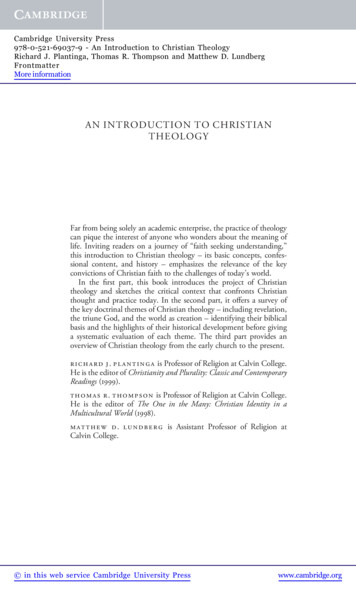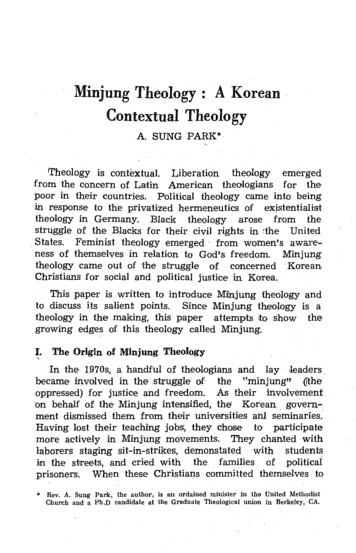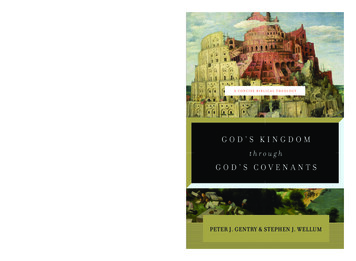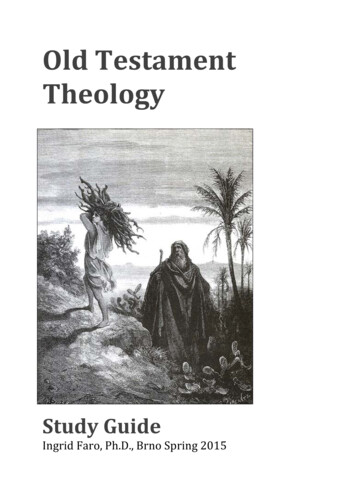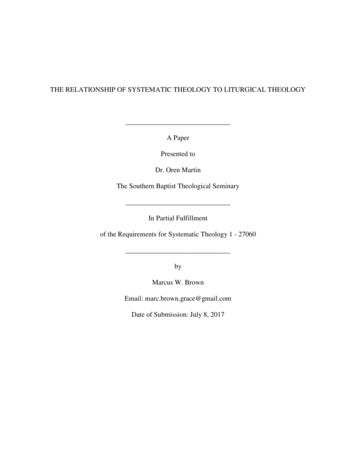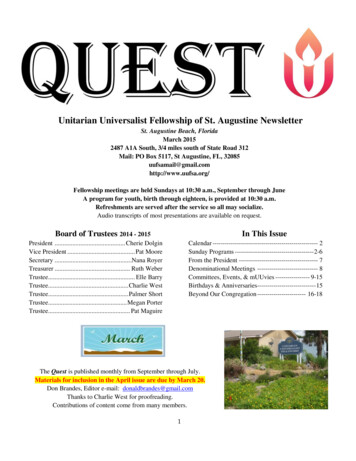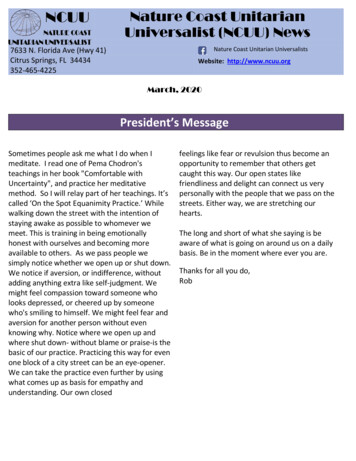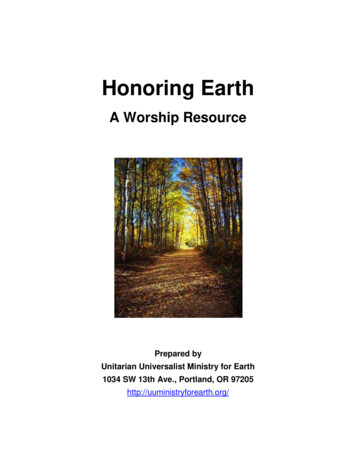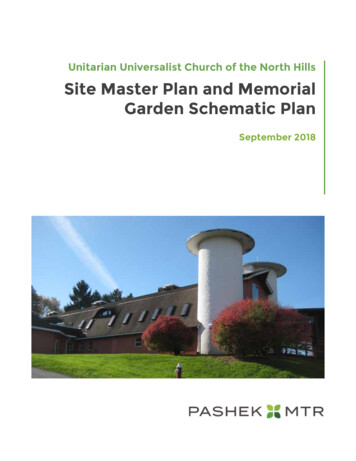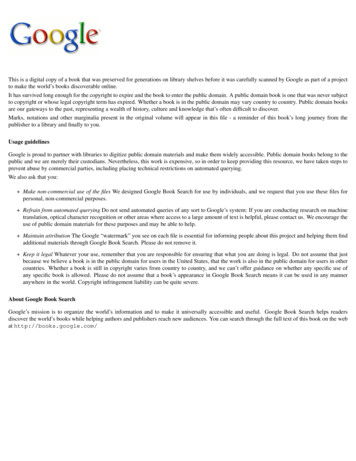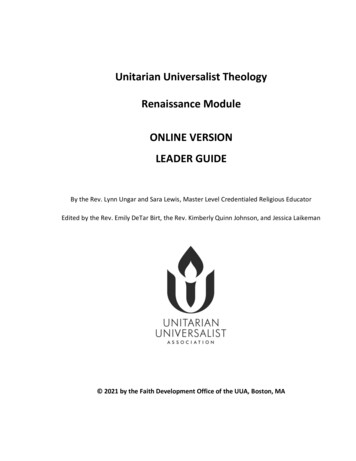
Transcription
Unitarian Universalist TheologyRenaissance ModuleONLINE VERSIONLEADER GUIDEBy the Rev. Lynn Ungar and Sara Lewis, Master Level Credentialed Religious EducatorEdited by the Rev. Emily DeTar Birt, the Rev. Kimberly Quinn Johnson, and Jessica Laikeman 2021 by the Faith Development Office of the UUA, Boston, MA
Table of ContentsAbout the Authors; Acknowledgement, About the Editors 3Introduction to the Module5Module Leaders7Participant Requirements10Overview of Session12Module Learning Objectives14Questions for Reflection and Discussion16Pre-Module Assignments26Session One: What Is Theology?28Session Two: Early Unitarianism and Universalism36Session Three: Expanding Beyond Christian Roots42Session Four: More 20th Century Influences49Session Five: 21st Century UU Theology57Session Six: Closing Session64Leader Resource 1: Sample Welcome Letter70Leader Resource 2: List of Slides73Leader Resource 3: Embodied Practices74UU Theology Renaissance Module, ONLINE – Leader Guide2
About the AuthorsRev. Dr. Lynn Ungar holds an M.Div. from Starr King School for the Ministry and a D. Min. inreligious education from McCormick Theological seminary. She has served as a parish ministerin Moscow, Idaho and Chicago; as a Director of Religious Education in Fremont and Hayward,California; and as Minister for Lifespan Learning for the Church of the Larger Fellowship, ouronline UU congregation (www.questformeaning.org and www.clfuu.org). Lynn is co-author ofthe Tapestry of Faith curricula Faithful Journeys and Love Connects Us and author of Sing to thePower. Lynn’s poetry can be found in a variety of publications, including her latest book Breadand Other Miracles. She is the composer of the round, “Come, Come, Whoever You Are,” Hymn188 in Singing the Living Tradition.Sara Lewis, unchurched in her early years, found Unitarian Universalism as a teen and hasserved as Director of Religious Education at the Olympia Unitarian Universalist Congregation inOlympia, Washington since 2008. Sara earned a Masters in Teaching from The Evergreen StateCollege and very briefly taught high school chemistry before realizing that was not the right fitfor her. Fortunately, religious education was the perfect fit. She earned her RE Credential at theMaster Level in 2014 and has served in chapter leadership and on various committees forLREDA. Sara joined the UUA’s RE Credentialing Committee in June 2017 and currently serves asthe committee chair.AcknowledgementUU Theology Renaissance Module, ONLINE – Leader Guide3
We are grateful for the technical and editorial assistance of Alicia LeBlanc, MinisterialCredentialing Administrator, both in the module documents and especially the online presence!About the EditorsThe Rev. Emily DeTar Birt currently serves at the Unitarian Church of Staten Island as a consultingminister. Emily also works as the Community Coordinator for a queer-centered, queer-ledworshipping community called Not So Churchy under Rev. Mieke Vandersall. Emily has a passionfor Unitarian Universalist faith and theologies and has taught this curriculum several times. Sheis grateful for the opportunity to co-edit this edition and continue sharing in her love for UnitarianUniversalism.The Rev. Kimberly Quinn Johnson serves as minister of the Unitarian Universalist Congregationof the South Fork, on Long Island in Bridgehampton, NY. She earned an M.Div. from MeadvilleLombard Theological School in 2015. Kimberly serves on the Organizing Collective Board for BLUU(Black Lives of Unitarian Universalism), is a member of the Steering Committee for UU ClassConversations, and is on the Board of Trustees of the UU Women's Federation. She also servesas vice-president of the St. Lawrence Foundation for Theological Education. She gets to work atthe nexus of faith formation, youth ministry, and racial justice as a Program Leader with the UUCollege of Social Justice.Jessica Laikeman serves as the Director of Lifespan Faith Formation at Boulder Valley UUFellowship and serves our UUA as the Camping Ministries Director for the Pacific WesternRegion. Jessica is a lifelong UU and has served as a religious educator in UU congregations forUU Theology Renaissance Module, ONLINE – Leader Guide4
over ten years. She is grateful to have worked with the Rev. Emily DeTar Birt recently facilitatingthis curriculum and is honored to be included as a co-editor.UU Theology Renaissance Module, ONLINE – Leader Guide5
Introduction to the ModuleWelcome to the Unitarian Universalist Theology Renaissance module. Theology is traditionallythought of as the study of the nature of God and religious truth, and in this program, we considertheology broadly to include the study of belief and meaning. A central task of any UnitarianUniversalist religious education program is to help people of all ages develop their ownunderstanding of central human questions such as What am I called to do with my life? What isevil and how do I respond? What is the biggest thing to which I belong? The answers a persongives to any of these big questions may change over time and will be based not only in thatperson’s experience, but also in the wisdom they gather through the ages.In this module, religious professionals explore several key theologies and theologians from ourUnitarian, Universalist, and Unitarian Universalist heritages, as well as influences from othertraditions. It asks participants to engage with the views presented and offer their own consideredviewpoints. This program, then, invites religious professionals into both a deeper knowledge ofour liberal religious heritage and a more profound understanding of their own beliefs, therebyequipping them to help others on their theological journeys.A Note from the EditorsAs the Unitarian Universalist Association continues to confront white supremacy within thesystems and structures of our denomination and faith, an examination of how we talk about ourUnitarian Universalist theology is vital. Similar to other Western faith traditions, we havehistorically lauded white cisgender male voices as the heroes or writers of our shared UnitarianUU Theology Renaissance Module, ONLINE – Leader Guide6
Universalist history and theology. BIPOC (Black, Indigenous, and Persons of Color) UUs havealways been molders, shakers and theologians of our Unitarian Universalist faith. With neweditions to this curriculum, it is our hope as editors that we not only showcase the diverse voicesthat make up the threads of our theologies, but also expand our definition of theology itself. Weattempt to shift the focus away from singular exemplars of theology, to looking at the widercontext from which our faith emerged. As you will read in “Widening Our Circle of Concern,”Because we have not updated our theology, the history we know privilegesthe dominant culture and those voices that were preserved in our historyand written record. We now have a chance to embrace a more inclusiveand accurate history. (COIC Report, 14)We hope that these changes are a small start for a more accurate and inclusive accounting ofhistory.UU Theology Renaissance Module, ONLINE – Leader Guide7
Module LeadersA team of two should facilitate this program. Leaders should be: Knowledgeable about Unitarian Universalism and religious education; Committed to Unitarian Universalism and to the professional development of religiouseducators; Approved as a module leader by the UUA’s Renaissance Office; Effective at facilitating group process, especially in an online setting; Able to thoroughly prepare for each session, including becoming comfortable with thetechnology used; Willing to track participant participation in sessions and assignments; Willing to review and approve final project plans two weeks prior to the final session;and Willing to offer honest feedback and suggestions to participants in regard to theirdiscussions, questions, and projects.While extensive knowledge of Unitarian Universalist history or theology is helpful, it is not arequirement for effectively leading this program. Willingness and ability to prepare for eachsession, to research answers to questions raised by participants, and to encourage participants'own research is far more valuable for creating a good learning experience than is extensiveknowledge of the various strains of Unitarian Universalist theology.UU Theology Renaissance Module, ONLINE – Leader Guide8
The document, “Leading an Online or Hybrid Renaissance Module” provides detailedinformation for module facilitation. After you have reviewed it, contact the Renaissance Officewith any additional questions you have.Prior to each session, leaders should: Email participants with information about the meeting login, shared documents folder,and any other necessary information. ”Leading an Online or Hybrid RenaissanceModule” provides a sample welcome letter. Edit the Appendix to this Leader Guide to include links to online material you may wishto provide while leading online discussion. The Appendix is designed to guide you inleading the online sessions. Read the designated selections from the readings. Review suggested ReflectionQuestions. Choose which are most appropriate for the group and context or create yourown questions. Test the technology for online sessions and prepare to offer guidance to participants. Itis helpful for leaders to schedule a brief run-through before the first session so they willbe able to help everyone feel comfortable with the technology and to address anyproblems. Plan to be online at least 15 to 30 minutes prior to the start of each webinarto center yourselves and ensure time for troubleshooting.UU Theology Renaissance Module, ONLINE – Leader Guide9
Decide which leader will be responsible for sending reminders to participants beforeeach session, recording the session, and tracking/responding to participant posts to thesession’s discussion forum and/or shared folder. Review the slides for each session. Make any adjustments needed for the group. Determine which leader will handle the technological needs and which the facilitationneeds for each session. You may find it helpful to have these roles clearly delineated.UU Theology Renaissance Module, ONLINE – Leader Guide10
Participant RequirementsThis module is an online learning experience comprised of six two-hour live sessions with readingand assignments to be completed before each session. Credit will be offered for full participationin the module. Full participation includes: Attendance. Participants are expected to attend each of the online sessions. Reading. Participants are expected to read, reflect, and complete activities to prepare foreach session. This may take two-three hours per session. All readings are included in thepdfs, so there is no need to purchase any reading materials. If you wish, you can purchase orborrow the book A People So Bold: Theology and Ministry for Unitarian Universalists:Theology and Ministry for Unitarian Universalists, John Gibb Millspaugh, ed. (Boston: SkinnerHouse Books, 2009). This text has two essays included in the required reading. Discussion. Each session’s preparation includes questions for reflection on the readings whichwill form the basis for discussion. Participants are expected to be fully prepared to participatein online discussions after reflecting on the questions, perhaps in a journal. Written assignments. In addition to completing the reading assigned for a session,participants are to reflect on the readings and discussions for each session, noting what struckthem most. Participants are asked to share these reflections with the group in written form(250 words) in the session’s online discussion forum. At the end of the module, eachparticipant will have generated a variety of ideas for sharing UU theology in your work.Assuming two weeks between webinars, participants should post in the discussion forumUU Theology Renaissance Module, ONLINE – Leader Guide11
during the week after each session so that they can devote the following week to reading andpreparing for the next session. Project. Participants will prepare a final project to demonstrate one way of using what theyhave learned about Unitarian Universalist theology in their professional work, working aloneor as a group of up to four people. An individual project should take eight to ten minutes topresent; a group project should take 15-20 minutes. Participants should submit a projectproposal to the module leaders for approval two weeks before the final sessionUU Theology Renaissance Module, ONLINE – Leader Guide12
Overview of SessionsSession One: What Is Theology?Activity 1: OpeningActivity 2: IntroductionsActivity 3: CovenantActivity 4: OrientationActivity 5: What Is Theology?BreakActivity 6: Our Theological DiversityActivity 7: Theology of Widening the Circle of ConcernActivity 7: Our Theological HouseActivity 8: ClosingSession Two: Early Unitarianism and UniversalismActivity 1: OpeningActivity 2: SharingActivity 3: Early UnitarianismBreakActivity 4: Early UniversalismActivity 5: On Religious InstructionActivity 6: ClosingSession Three: Expanding Beyond Christian RootsActivity 1: OpeningActivity 2: SharingActivity 3: TranscendentalismBreakActivity 4: Introduction to HumanismActivity 5: Fahs as TheologianActivity 6: ClosingUU Theology Renaissance Module, ONLINE – Leader Guide5 minutes20 minutes5 minutes10 minutes25 minutes5 minutes10 minutes10 minutes20 minutes10 minutesTotal Time: 2 hours5 minutes25 minutes25 minutes5 minutes25 minutes25 minutes10 minutesTotal Time: 2 hours5 minutes15 minutes35 minutes5 minutes35 minutes15 minutes10 minutesTotal Time: 2 hours13
Session Four: More 20th Century InfluencesActivity 1: OpeningActivity 2: SharingActivity 3: James Luther Adams and Religious LiberalismActivity 4: Clarence Skinner and the Social Gospel MovementBreakActivity 5: Process TheologyActivity 6: Liberation TheologyActivity 7: Paolo FreireActivity 8: ClosingSession Five: 21st Century UU TheologyActivity 1: OpeningActivity 2: SharingActivity 3: 21st Century TheologiesActivity 4: The Prophetic ChurchBreakActivity 5: Where Are We Headed?Activity 6: Final ProjectsActivity 7: ClosingSession Six: Closing SessionActivity 1: OpeningActivity 2: SharingActivity 3: Final Projects Part 1BreakActivity 4: Final Projects Part 2Activity 5: Next StepsActivity 6: ClosingUU Theology Renaissance Module, ONLINE – Leader Guide5 minutes15 minutes15 minutes15 minutes5 minutes15 minutes25 minutes15 minutes10 minutesTotal Time: 2 hours5 minutes10 minutes25 minutes25 minutes5 minutes15 minutes25 minutes10 minutesTotal Time: 2 hours5 minutes10 minutes35 minutes5 minutes35 minutes20 minutes10 minutesTotal Time: 2 hours14
Module Learning ObjectivesParticipants will: Develop a sense of the broad scope of Unitarian, Universalist, and Unitarian Universalisttheology and become familiar with some of the theologians and thought leaders,historical and modern, who have contributed to Unitarian Universalist thought; Explore significant theological movements such as Transcendentalism, Humanism,Process Theology, and Liberation Theology that have shaped our contemporary religiousmovement; Develop and articulate their own point of view on key theological questions; Apply theological understandings to real-life liturgical and educational forums to helppeople of all ages explore theological questions; Nurture a theology of justice and service in individuals and congregations; and Contextualize our theology with an anti-racist and multi-cultural lens, as well as unpackwhite cis-heteronormative structures that have been passed down through differenttheologies.UU Theology Renaissance Module, ONLINE – Leader Guide15
ReadingEach session features several readings, as well as a variety of brief quotations. All readings areincluded in the pdfs for each session, so there is no need to purchase any reading materials. Ifyou wish, you can purchase or borrow the book, which has two essays included in the readings,A People So Bold: Theology and Ministry for Unitarian Universalists: Theology and Ministry forUnitarian Universalists, John Gibb Millspaugh, ed. (Boston: Skinner House Books, 2009).AssignmentsIn addition to completing the reading assigned for a session, participants are to reflect on thereadings and discussions for each session which struck them. Participants are asked to share itwith the group in written form (roughly 250 words) in the session’s online discussion forum. Atthe end of the module, each participant will have generated a variety of ideas for sharing UUtheology in your work. Assuming two weeks between webinars, participants should post in thediscussion forum during the week after each session so that they can devote the following weekto reading and preparing for the next session.Questions for Reflection and DiscussionUse these reflection questions to guide your reading. They will provide the basis for the sessiondiscussions.Session One: What is Theology?UU Theology Renaissance Module, ONLINE – Leader Guide16
Reading 1: What is Theology? What is your most important theological question right now? Has it been different atother times in your life? Discuss the theological statements shared in the discussion forum. What are some instances in which you have engaged in theological learning with yourcommunity or with yourself?Reading 2: Our Theological Diversity Which do you think is most vital to Unitarian Universalism: our differences or oursimilarities? Why?Reading 3: Widening the Circle of Concern Do you believe freedom and individuality are our most important aspects to offer as areligion? What else do we have to give? “These times require a liberatory faith that invites each into the spiritual work ofempathy and healing.“ (COIC Report, 18). Where is your faith calling you towardsempathy and healing?Reading 5: Our Theological House Rebecca Parker first introduced the metaphor of the theological house at the October2003 Liberal Religious Educators Association (LREDA) Fall Conference, “The Theology ofReligious Education”. How does this “hope-filled religious framework” resonate intoday’s political and cultural climate? What is the area of focus that stands out most for you from this model?UU Theology Renaissance Module, ONLINE – Leader Guide17
Session Two: Early Unitarianism and UniversalismReading 1: Unitarianism Unitarians value the human ability to do good, William Ellery Channing goes so far towrite an essay called “Likeness to God.” How do you view human nature, and how doesthat factor into your faith? Both William Ellery Channing and Frances Ellen Watkins Harper position UnitarianChristianity against contemporary understandings of Christianity in their own times.How would you compare today’s contemporary understanding of Unitarianism to theUnitarianism described by Channing and Harper?Reading 2: Universalism One of the defining tenets of Universalism is its understanding of salvation. How do youunderstand/define salvation? Does this concept have theological resonance for youtoday? What is your definition of evil? What does universal love mean to you? Are theseconcepts related to our Eight Principles?Reading 3: On Religious Instruction Channing talks about the “great end of religious instruction.” What does that mean toyou? William Ellery Channing, Judith Sargent Murray and Joseph Jordan offer three distinctapproaches to Religious Education. How would you describe the purpose of religiousUU Theology Renaissance Module, ONLINE – Leader Guide18
education today? Who is religious education for? What, at heart, do you think religiouseducation should do?Session Three: Expanding Beyond Christian RootsReading 1: Transcendentalism – Margaret Fuller Transcendentalists like Fuller, Parker, and Emerson were not in the mainstream ofUnitarian Universalism during their time. How did they break from mainstreamUnitarians? How might their contemporaries have responded to their theologies? Margaret Fuller says, “I saw there was no self; that selfishness was all folly . . . that itwas only because I thought self real that I suffered; that I had only to live in the idea ofthe all, and all was mine.” How does this idea of losing the idea of “self” in service of thewhole, show up in your congregations; or if it doesn’t, what has been lost by leaving thistheology out of our current contexts?Reading 2: Transcendentalism – Theodore Parker What do you think Parker is getting at when he says that some things are permanentand some things are transient in Christianity? Consider how Transcendentalists like Fuller, Parker, and Emerson balanced spiritual lifeand the call for ethical and moral engagement on social issues. How do you understandthe relationship between your spiritual life and the call of public engagement on socialissues?Reading 3: UU Spirituality by Barry AndrewsUU Theology Renaissance Module, ONLINE – Leader Guide19
Where do you see Transcendentalism (or Transcendentalist ideas) in contemporaryUnitarian Universalism?o As much as UUs love to quote and claim Emerson and Thoreau, why do you thinktheir actual theology is not more present in our congregations?Reading 4: Humanism What do you think is lost or gained when God/Spirit/Higher Power, etc. is removed fromreligion? What compels you to do good? What is the theological or philosophical grounding thatpushes you to work for justice and to care for others? How does (can?) humanism respond to questions of evil and suffering, especially as itrelates to race and racism? What does humanism offer for the possibility of liberation? How would you describe human nature? Are you optimistic or pessimistic about theability and desire of human beings to create a better world? How would you define humanism? What resonates within humanism for you? Yourcongregation?Reading 5: Fahs as Theologian Last week we read William Ellery Channing's work describing, "the great end of religiousinstruction.” What do you think Sophia Lyon Fahs’ "great end" or purpose is? For both Fahs and MacLean, how we teach religious education says a lot about what webelieve. What aspects of Fahs’ and MacLean’s educational philosophies are still relevantUU Theology Renaissance Module, ONLINE – Leader Guide20
today? How do these religious educational philosophies help you think about your owntheology?Session Four: More 20th Century InfluencesReading 1: James Luther Adams and Religious Liberalism What five characteristics do you think best define religious liberalism? What differencesdo you see between the five smooth stones and the UUA’s Principles and Sources? Are individualism and communal responsibility opposite poles? What is the properrelationship between the two? How does this tension between individualism andcommunity play out in your congregation? In your religious education classrooms?Reading 2: Clarence Skinner and the Social Gospel Movement What is the Social Gospel Movement? How does Clarence Skinner bring it toUniversalism? In what ways do you engage Unitarian Universalists in creating the “kingdom on earth?”Reading 3: Process Theology What do you think of this conception of God? Is this understanding of God reflected inour humanist/atheist vs. theist debates? Would amplifying this understanding be ofbenefit to Unitarian Universalism, and why?Reading 4: Liberation Theology In what ways do you find Liberation Theology compatible with Unitarian Universalism?UU Theology Renaissance Module, ONLINE – Leader Guide21
How can Unitarian Universalists engage authentically with Liberation Theology? Arethere systemic or cultural norms within Unitarian Universalism that would have tochange if we took Liberation Theology seriously? In “Jesus is Black,” Dr. Cone addresses his white counterparts’ concerns about the“universalism” of his theology. He says, “I contend that there is no universalism that isnot particular.” Do you agree?Reading 5: Paolo Freire’s Philosophy of EducationFor Freire, education is inherently political, never neutral. Education either domesticatespeople by imposing the values and culture of the dominant class or it frees people by helpingthem to become critical, creative, free, active, and responsible members of society. A liberatingeducation has a reconstructive character: it involves a commitment to overcome the forces ofoppression and thereby reconstruct society. What do you think of Paolo Freire’s five key principles of adult education? How usefuldo you think Freire’s philosophy of education is in working toward empowerment andliberation?Session Five: 21st Century UU TheologyReading 1: 21st Century Theologies Thandeka describes Unitarian Universalists as having a common emotional experiencewith the mental space to explain it in different ways theologically. What have you foundto be a common emotional experience in Unitarian Universalism?UU Theology Renaissance Module, ONLINE – Leader Guide22
Thandeka says we “love beyond belief,” but Rebecca Parker identifies limits to what wecan believe as UUs. Are the limits described by Parker true for you, and do you see anyother limits to belief besides those she describes? Authors Thandeka, Rebecca Parker, Paula Cole Jones, and Paul Rasor, each in differentways, describe the challenges in identifying a common Unitarian Universalist theology orexperience. Is such a common theology possible or even desirable? How would youbegin to articulate a common Unitarian Universalist theology? What does it mean to bea Unitarian Universalist?Reading 2: The Prophetic ChurchIn her lecture, Paula Cole Jones suggests an identity change for our congregations, from seeingourselves as family to seeing our churches as a “community of communities.” How is your congregation already functioning as a community of communities? In whatways might it evolve further? How would such changes both require and advance shiftsin power dynamics in the congregation?Paul Rasor says, “Reclaiming our religious identity requires recovering and naming the coretheological principles that ground us as a movement.” Do you agree with Rasor’s principles? Are there others you would add? Paul Rasor begins his essay with, “we cannot create a prophetic church unless we knowwho we are.” What does it mean to be a prophetic church? How does yourUU Theology Renaissance Module, ONLINE – Leader Guide23
understanding of our UU identity and our UU theology serve as a grounding for aprophetic UU church?Both Sofia Betancourt and Sharon Welch describe ethics—Betancourt, an ethic of land andWelch, an ethic of risk. What role do ethics play in your understanding of faith? What do you think of Welch’sethic of risk? What do you think of Betancourt’s ethic of land? How might an ethic ofrisk or an ethic of land, as described, create opportunities for future justice work?Hicks says that “For hope-filled action to lead to a cultural shift, we must create environmentsthat help advocates for change stay engaged.” How do you stay engaged in social change efforts? Mark Hicks describes the need to learn, unlearn, and relearn in order to createtransformative educational experiences. How can you, in your work, create suchtransformative learning experiences?Video: The BLUU SymposiumIn the BLUU Symposium video, the BLUU Organizing Collective Board talks about what it meansto center Blackness in Unitarian Universalism. How might Unitarian Universalism be strengthened by centering many particularidentities?UU Theology Renaissance Module, ONLINE – Leader Guide24
Find Out MoreEach session concludes with a list of books, articles, and websites for further exploration. Letparticipants know that these resources may be particularly helpful in developing a final project.Final ProjectParticipants will prepare a final project that shows a way to use what they have learned aboutUnitarian Universalist theology in their professional work, working alone or as a group of up tofour people. An individual project should take eight to ten minutes to present; a group projectshould take 15-20 minutes.To seek ideas for the final project, participants may review ideas for applying learning that havebeen shared over the course of the module and review the resources in each session’s “FindOut More” section. The project can be a development of an idea from the group’s collection orsomething entirely new. Any electronic format may be used in presentation. For example, aslide show/PowerPoint; uploaded or screen-shared documents or flyers; video; audio; andshares from Pinterest, Tumblr, or a blog site are all possibilities. Participants should submit aproject proposal to the module leaders for approval two weeks before the final session. Leadersmay offer suggestions or request revisions in your plan. Participants will be asked to post theirfinal projects in a shared folder by a date before the start of the final session.UU Theology Renaissance Module, ONLINE – Leader Guide25
Pre-Module AssignmentsTo access the module pages online, each leader and participant must have a UUA log-in.Instructions are included in the welcome letter (Leader Resource 1) which leaders should sendto participants at least two weeks in advance.Post an IntroductionA week before the first meeting, leaders should post an introduction in the Session 1 DiscussionForum and invite participants to introduce themselves, as well. Ask (and model) thatparticipants include their current involvement with religious education, their location, andanything else that would help the group to get to know them better, along with a briefstatement of their own (current) theology. You may use these words, or your own:“We arrive out of many singular rooms,” writes Unitarian Universalist minister KennethPatton in a frequently used responsive reading, Reading 443 in Singing the LivingTradition. Each person in this group brings a unique set of experiences, skills andinterests to our comm
online UU congregation (www.questformeaning.org and www.clfuu.org). Lynn is co-author of the Tapestry of Faith curricula Faithful Journeys and Love Connects Us and author of Sing to the Power. Lynn's poetry can be found in a variety of publications, including her latest book Bread and Other Miracles. She is the composer of the round, "ome .

